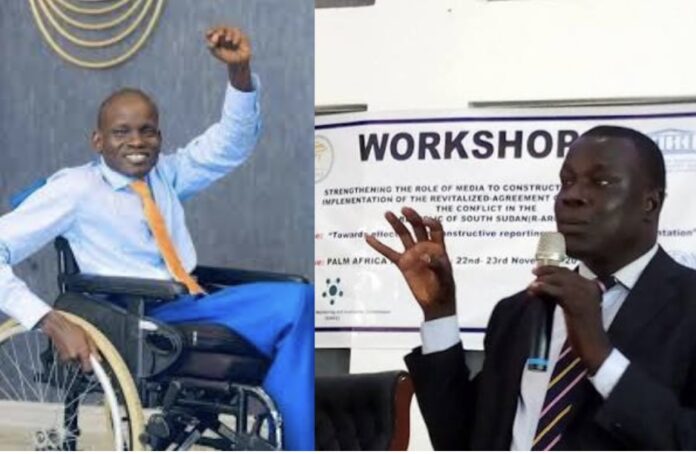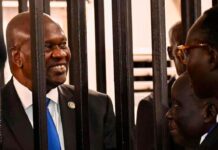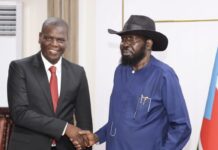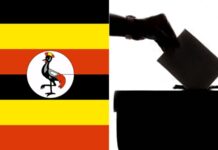Member of the Red Army Foundation, Dr. Deng Bol Aruai Bol has publicly condemned derogatory and ableist remarks made by academic Dr. James Okuk—following a heated online exchange over South Sudan’s political future.
Dr. Okuk posted on factbook “Whoever wants to break up South Sudan after all we have gone through doesn’t deserve respect but condemnation, even if he is a raw politician on a wheelchair.”
Dr. Bol is a disabled person using wheelchair responded with a strongly worded statement, expressing disappointment that a scholar and former diplomat would resort to personal and ableist attacks instead of engaging in intellectual debate.
“While people may disagree with my ideas, it is deeply disappointing and frankly unbecoming for a diplomat and academic of Dr. Okuk’s stature to mock someone’s physical condition instead of responding to the substance of the argument,” Dr. Bol said.
He emphasized that his political positions are rooted in democratic discourse and deserve engagement, not ridicule.
Beyond personal insult, Dr. Bol said the comments represented a broader affront to persons with disabilities striving to participate in public life with dignity and purpose.
“Dr. Okuk did not just insult me he insulted every person living with a disability who contributes to our society with courage and dignity,” he added.
Dr. Bol called on academic institutions, diplomatic networks, and human rights bodies to take note of Dr. Okuk’s remarks. He urged those affiliated with him to consider mandatory sensitivity and ethics training, noting that public figures have a responsibility to uphold inclusive and respectful standards.
“We must hold public intellectuals and diplomats to higher standards. There is no place in our national discourse for mockery based on disability or physical condition,” Dr. Bol stated.
The controversy has ignited widespread condemnation across social media platforms, with many South Sudanese including those who oppose Dr. Bol’s political views expressing solidarity with him over the nature of the attack.
“Many of us disagree with Dr. Deng Bol’s call for Upper Nile secession. But that doesn’t justify mocking his disability. That’s not debate that’s dehumanization,” one user wrote on Facebook.
Others criticized Dr. Okuk’s attempts to walk back his comments as misunderstood or idiomatic. A particularly viral response read:
“The correct term is ‘armchair politician,’ not ‘wheelchair politician.’ Your phrase clearly targeted someone’s disability. That’s not an idiom—it’s an insult.”
Some users accused Dr. Okuk of hypocrisy and lacking merit, claiming his diplomatic appointments were nepotistic and his conduct unprofessional.
Despite the backlash, some social media commentators called for restraint, suggesting education over punitive action.
“You don’t fire someone for saying something vile. You educate them,” one user wrote.
“Yes, Dr. Okuk needs to be held accountable—but that starts with owning up, apologizing, and learning from this moment.”
This incident has sparked deeper national conversations on the ethics of political discourse, the treatment of persons with disabilities, and the tone of South Sudanese intellectual debates—often marred by personal attacks rather than policy dialogue.
Calls continue to mount for Dr. Okuk to issue a formal public apology, particularly given his academic and diplomatic background.
As of publication, Dr. Okuk has not apologized though he did not mentioned a particular person on his post. He has, however, attempted to justify his language as figurative a defense many have rejected as disingenuous.





